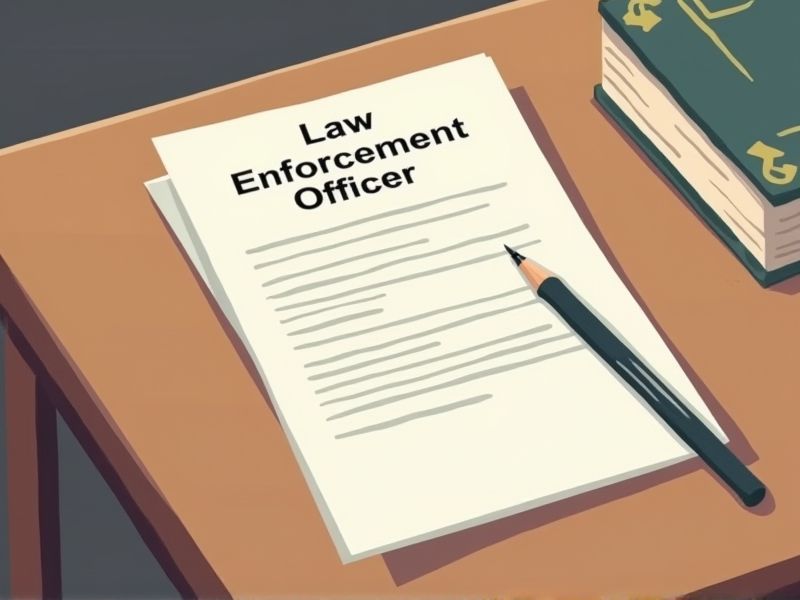
Law enforcement officers require certain certifications to ensure they possess the necessary skills and knowledge to effectively perform their duties. These certifications cover a range of areas, including firearms proficiency, first aid, crisis intervention, and legal updates, equipping officers with critical tools for varied situations. Certification programs also help maintain public trust by ensuring officers adhere to professional standards and ethical guidelines. Some crucial certifications for law enforcement officers include those focused on tactical expertise, emergency response, and community engagement.
POST Basic Certification
POST Basic Certification ensures law enforcement officers meet standardized training and competency requirements, fostering uniformity across jurisdictions. It provides foundational knowledge and skills necessary for effectively handling various situations, enhancing public safety. Certification establishes a benchmark for assessing an officer's readiness and ability to perform duties. It increases public trust by demonstrating that officers possess verified qualifications and adhere to professional standards.
CPR and First Aid Certification
CPR and First Aid certification equips law enforcement officers with the necessary skills to respond effectively to medical emergencies, potentially saving lives during critical situations. Officers often encounter situations where immediate medical attention is required, and having certified skills can bridge the gap until professional medical help arrives. Certification in these areas enhances an officer's ability to provide a community-focused service, fostering trust and credibility among the public. Proper training reduces the likelihood of liability issues for the department, as officers equipped with the relevant skills are better positioned to handle emergencies safely and efficiently.
Firearms Training Certification
Firearms training certification ensures that law enforcement officers have the necessary skills and knowledge to safely handle weapons, minimizing the risk of accidental discharges. Without proper training, an officer's ability to make split-second, life-or-death decisions could be compromised, risking public safety. Certification programs often include legal instruction, ensuring officers are aware of when they can legitimately use their firearm according to the law. By standardizing training, departments can maintain consistency in officer preparedness and response across various situations.
Use of Force Certification
Use of Force Certification is necessary to ensure that law enforcement officers are adequately trained to handle high-pressure situations, reducing the likelihood of excessive force incidents. It sets a standard for accountability, fostering public trust within communities and minimizing legal liabilities for police departments. Certification helps officers understand the legal and ethical implications of their actions, promoting adherence to established protocols. By consistently evaluating and updating training programs, agencies can adapt to evolving societal expectations and reinforce officers' decision-making skills in the field.
Defensive Tactics Certification
Defensive Tactics Certification provides law enforcement officers with the skills necessary to handle confrontations safely, reducing the risk of injury to both officers and suspects. Proper certification enhances decision-making under stress, allowing officers to effectively de-escalate potentially volatile situations. Training ensures that officers use appropriate force levels, which aligns with legal and ethical standards, thereby minimizing liability and fostering public trust. Regularly updated certification reflects current best practices and evolving legal standards, promoting accountability and competence in law enforcement operations.
Crisis Intervention Certification
Crisis intervention certification enhances law enforcement officers' ability to manage situations involving individuals with mental health issues, reducing the likelihood of escalation. It provides the necessary skills to de-escalate potentially violent encounters, thereby contributing to community safety. This training increases officers' confidence in handling unpredictable scenarios, which lowers officer stress and improves decision-making under pressure. The certification promotes a better understanding of mental health conditions, leading to more empathetic and effective community policing.
Emergency Vehicle Operations Certification
Emergency Vehicle Operations Certification ensures law enforcement officers possess the necessary driving skills during high-pressure situations, reducing accident risks. This certification provides standardized training, leading to consistent and effective responses across different jurisdictions. Officers learn techniques to handle various driving conditions, contributing to public safety and officer safety. It establishes a foundation for accountability, as certified officers can be evaluated and held to a common professional standard.
Investigative Techniques Certification
Investigative Techniques Certification equips law enforcement officers with advanced skills in crime scene analysis, which enhances their ability to gather reliable evidence. This certification standardizes investigative procedures, reducing inconsistencies that can compromise case integrity. Gaining expertise through certification courses increases an officer's proficiency, leading to higher clearance rates for complex cases. Law enforcement agencies benefit from certified personnel by strengthening public trust through more effective and transparent investigations.
Community Policing Certification
Community Policing Certification enhances officers' skills in effectively engaging with diverse communities, which can lead to improved trust and cooperation between law enforcement and the public. This certification provides officers with training that focuses on conflict resolution and problem-solving, reducing the likelihood of escalated situations. Understanding community dynamics lowers crime rates as it allows officers to address root causes rather than just symptoms. Pursuing this certification aligns with contemporary policing strategies that prioritize partnerships and proactivity.
Active Shooter Response Certification
Active Shooter Response Certification equips law enforcement officers with the specialized skills necessary to effectively neutralize active threats. Training enhances situational awareness, allowing officers to better protect civilians and themselves during high-pressure incidents. Certification ensures standardized procedures are followed across different agencies, improving overall coordination during emergencies. Access to evidence-based tactics advances officers' understanding of best practices, leading to more efficient and safer outcomes.
Summary
You can expect improved confidence in law enforcement officers when they acquire certifications, as this additional training enhances their skills and knowledge. The certified officers are likely to demonstrate increased efficiency in handling diverse and complex situations. Communities may benefit from greater trust and cooperation, seeing officers as more competent and credible. The overall reduction in errors and misconduct incidents can lead to a safer community environment.
